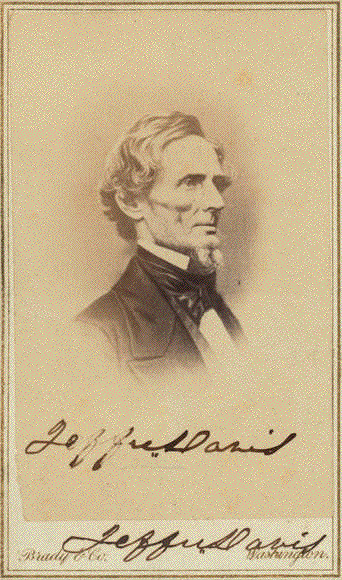Encyclopedia Dubuque
"Encyclopedia Dubuque is the online authority for all things Dubuque, written by the people who know the city best.”
Marshall Cohen—researcher and producer, CNN
Affiliated with the Local History Network of the State Historical Society of Iowa, and the Iowa Museum Association.
DAVIS, Jefferson: Difference between revisions
No edit summary |
No edit summary |
||
| Line 1: | Line 1: | ||
[[Image:jeffersondavis.gif| | [[Image:jeffersondavis.gif|left|thumb|250px|Jefferson Davis]]DAVIS, Jefferson. (Fairview, KY, June 3, 1808-New Orleans, IA, Dec. 6, 1889). President of the Confederate States of America. In 1832 Davis, then a lieutenant in the U.S. Army, was ordered to the [[LEAD]] mines of Dubuque to prevent whites from occupying land still belonging to Native Americans. | ||
Davis again played a major role in Dubuque history when in 1852 as secretary of war he was convinced by Senator [[JONES, George Wallace|George Wallace JONES]] into making a third appropriation for work on the Dubuque [[ICE HARBOR]]. | Davis again played a major role in Dubuque history when in 1852 as secretary of war he was convinced by Senator [[JONES, George Wallace|George Wallace JONES]] into making a third appropriation for work on the Dubuque [[ICE HARBOR]]. | ||
Revision as of 01:48, 22 November 2021
DAVIS, Jefferson. (Fairview, KY, June 3, 1808-New Orleans, IA, Dec. 6, 1889). President of the Confederate States of America. In 1832 Davis, then a lieutenant in the U.S. Army, was ordered to the LEAD mines of Dubuque to prevent whites from occupying land still belonging to Native Americans.
Davis again played a major role in Dubuque history when in 1852 as secretary of war he was convinced by Senator George Wallace JONES into making a third appropriation for work on the Dubuque ICE HARBOR.
After his capture at the end of the CIVIL WAR on May 10, 1865, Davis was led to prison by a guard of one hundred Union soldiers including George W. HEALEY of Dubuque.


